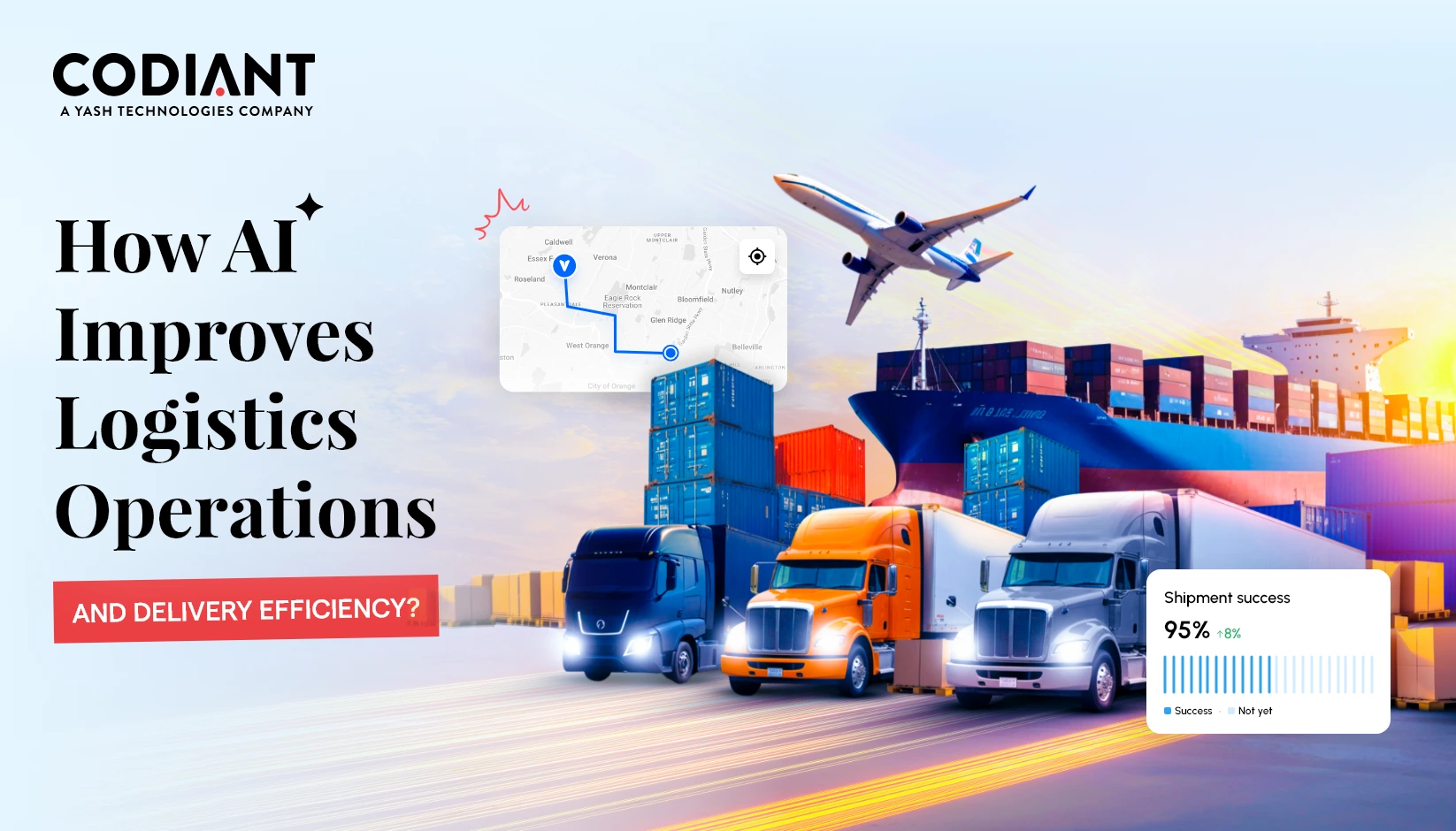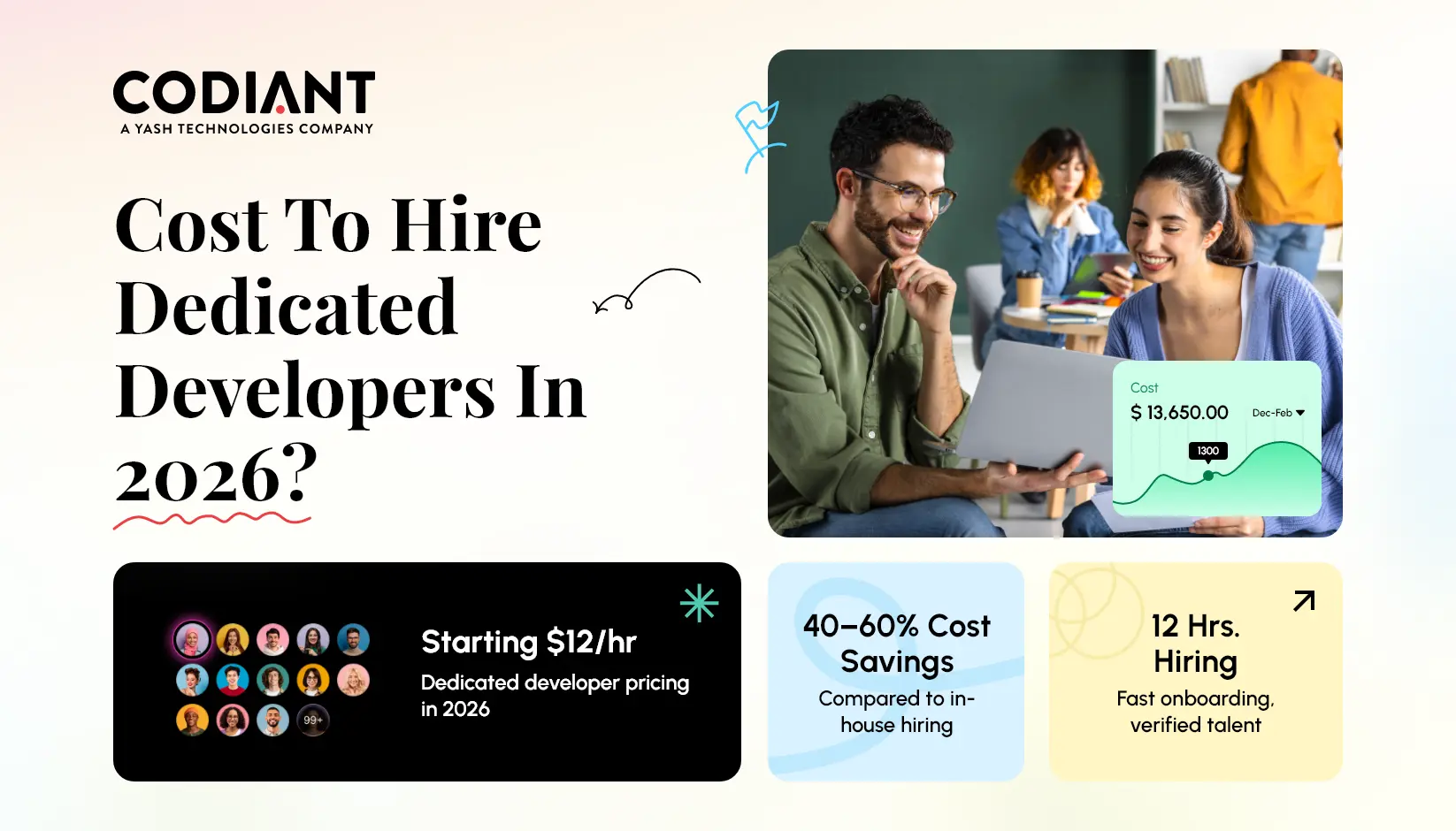Detailed Comparison on Web App vs Mobile App
Table of Contents
Subscribe To Our Newsletter
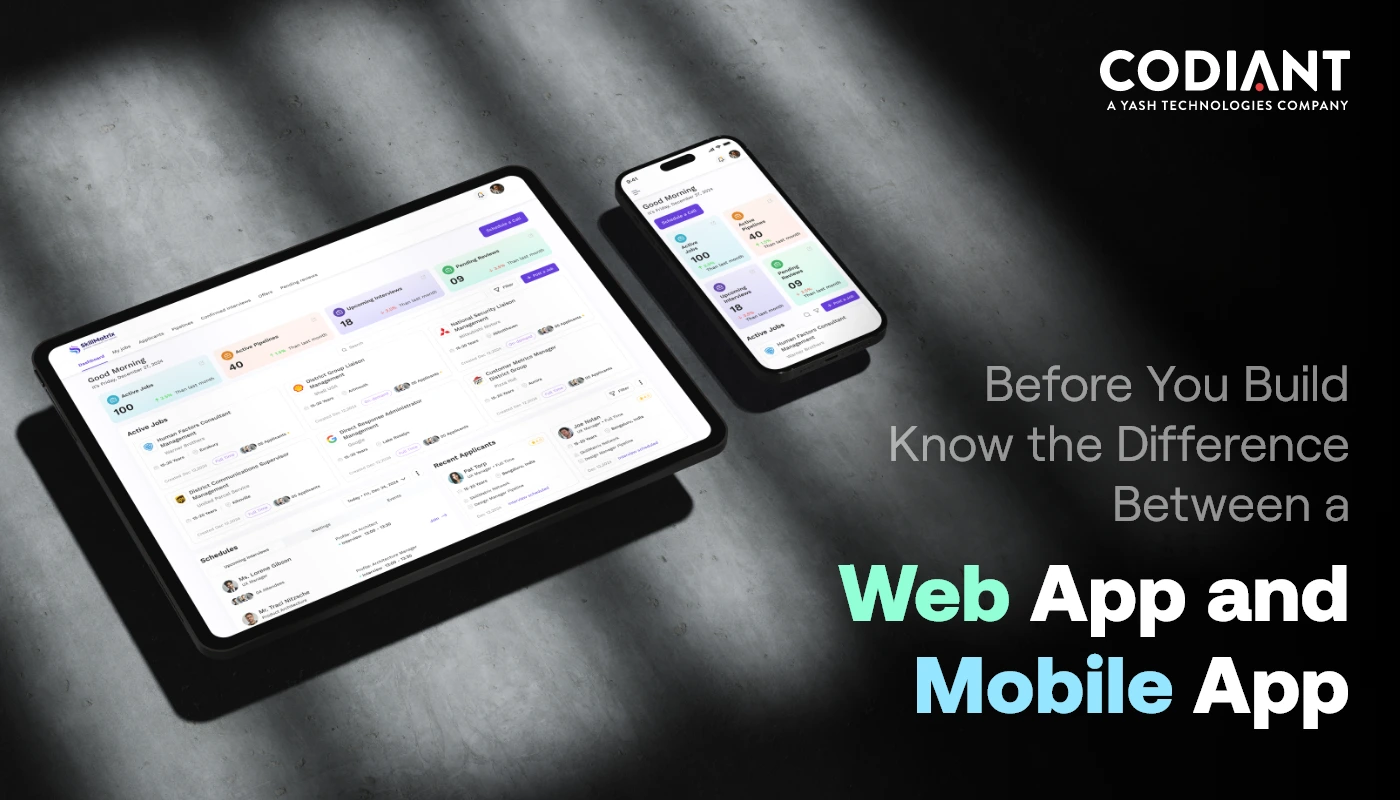
Users expect instant, seamless digital experiences on any device, at any time. That expectation has triggered a massive shift in how businesses deliver value: through online software applications like web apps and mobile apps that respond to specific usage patterns and behavior.
With Statista predicting 187 billion-plus app downloads per year and desktop-first professionals only increasing their web-based usage, the platform you decide is a technological choice as well as a tactical business play.
Deciding between a web app vs mobile app doesn’t only about the list of features; It’s a choice that aligns with your customers’ habits, protects your development investment, and shortens your time-to-market. For tech founders, digital consultants, and product leaders, understanding the difference between a web app and mobile app can mean the difference between scalable success and missed opportunities.
This blog offers a complete breakdown—definitions, comparisons, real-world examples, and when to choose what—to help you make informed decisions based on both functionality and user behavior.
The Wrong Platform Can Cost You Growth.
Don’t let a poor tech choice slow you down. Your users expect more—and your business deserves better.
We turn product uncertainty into clarity with expert guidance that puts performance, scale, and ROI at the center. Start with the Right Build
What Is a Web App?
A web app is a browser-based software application that offers your website users similar functionality to a software program. Web apps are interactive; they provide real-time interactivity and are created using frontend and backend frameworks experts like React, Angular, Node.js, or Django developers.
In these applications, no downloads or installations, and updates are pushed out from the server. This makes it the first choice for businesses looking for speed, configurability, and reduction in cost.
Types of Web Apps
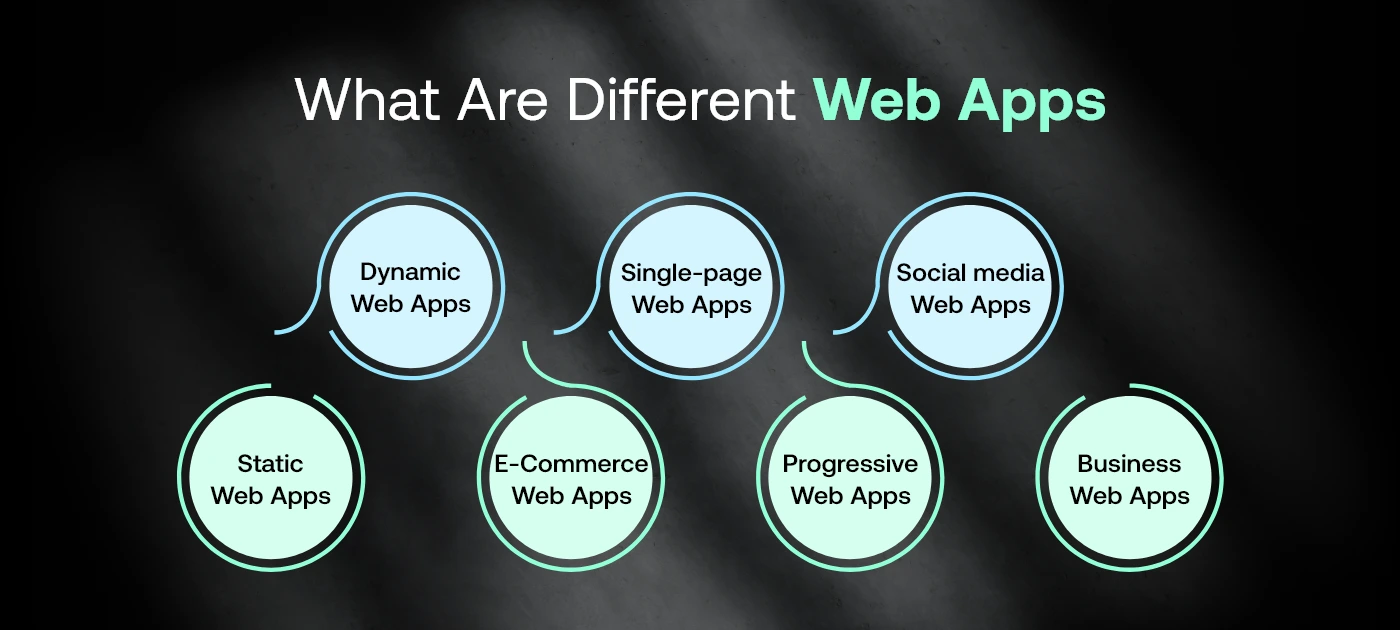
There are different types of web applications, each serving particular business requirements from internal tools and customer portals to scalable SaaS platforms and eCommerce solutions.
Examples of modern web application ideas include:
- CRM platforms
- Inventory dashboards
- Hotel booking engines
- Internal HR management systems
Web apps are particularly popular for MVPs and B2B SaaS tools where cross-device access and low maintenance are crucial.
What Is a Mobile App?
A mobile app is a software made to run on mobile devices and tablets. With the help of native tools, including Kotlin for Android phones, Swift for iPhones, or cross-platform tools like React Native or Flutter, mobile app developers create an app. Mobile app user can download the app from app stores and get it installed on their device.
What makes mobile apps powerful is their ability to tap into the device’s hardware features—camera, GPS, push notifications, sensors, and work offline in many cases. Also, read top mobile app trends to watch in 2025 and beyond.
Types of Mobile Apps
There are different types of mobile apps, built to address diverse business goals—from customer engagement and loyalty to field operations, sales enablement, and real-time service delivery.
Think of apps like:
- WhatsApp for real-time messaging
- Uber for geolocation and ride requests
- Your banking app for secure transactions
They provide smooth, immersive user experiences, making them ideal for businesses focused on high engagement or feature-rich environments. Explore tips and tricks for cost effective app development.
Web App vs Mobile App: Feature Comparison Table
This table breaks down the technical and user-experience-based differences, helping you understand which platform best suits your goals.
| Feature | Web App | Mobile App |
| Accessibility | Browser-based access | App store installation required |
| Platform | Works on any device | Platform-specific or hybrid |
| Speed | Depends on internet and browser | Faster, smoother native performance |
| Offline Capability | Limited; PWAs offer partial offline use | Full offline support in most cases |
| Development Cost | Lower to moderate | Higher (for dual-platform development) |
| Updates | Pushed via server instantly | Requires app store approvals for each update |
| Installation | Not required | Manual install necessary |
This clear comparison supports your decision-making by offering a high-level view of what to expect from each type of development.
Pros and Cons of Web Apps
Trying to decide between building a web app or a mobile app? One of the first things you’ll notice is how flexible web apps can be. They’re a go-to option when time, budget, and platform reach are top priorities. But of course, like any tech decision, there are pros and cons to weigh before jumping in.
Why Web Apps Are a Smart Pick
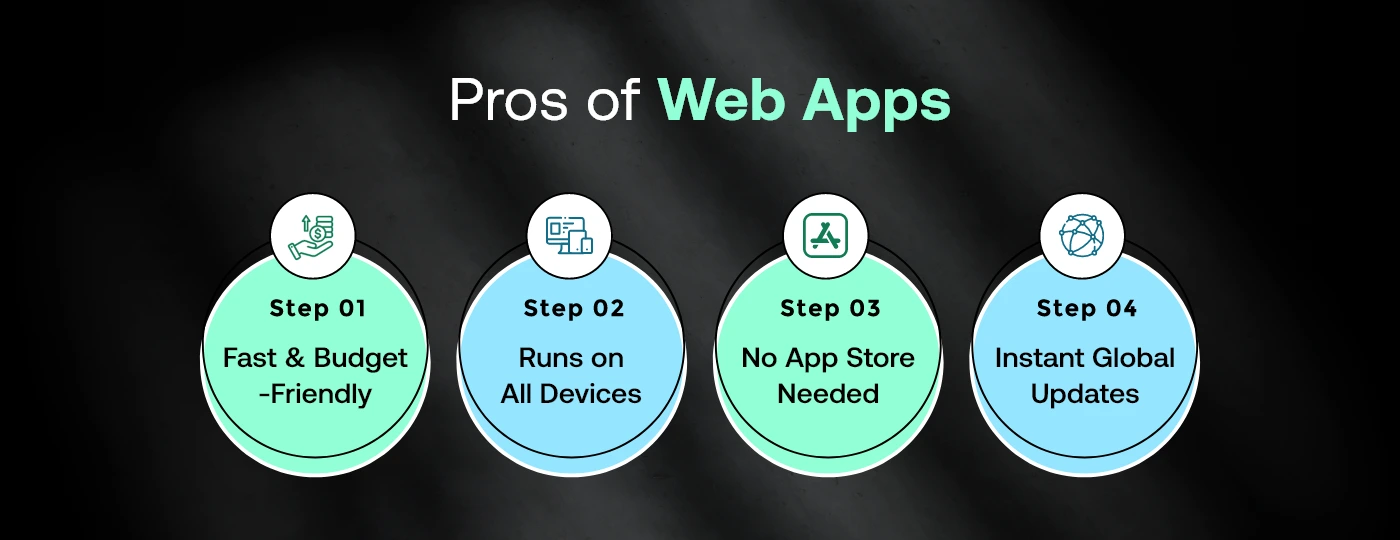
- Quick to Launch & Easy on the Budget: If speed and cost matter—say you’re testing new web application ideas or building a minimum viable product (MVP)—web apps can be developed faster and for less than their mobile counterparts.
- One Code Runs on All Devices: In the web app vs mobile app debate, this is a big win. Web apps run on desktops, tablets and phones, and don’t need platform-specific versions.
- No App Store Hassles: Web apps are browser-based, which means no need for users to download anything or wait for store approvals. Just share a link, and they’re in.
- Update Once for Everyone: Since web apps are hosted on a server, updates roll out instantly to all users. That’s one less thing to manage.
But Web Apps Aren’t Perfect. Here’s What to Watch For.
- Limited Access to Device Hardware: Unlike native mobile apps, web apps can’t fully tap into things like GPS, camera, or fingerprint sensors. If you need deep integration, this could be a deal-breaker.
- Mostly Online-Only: Unless you’re building a PWA (Progressive Web App), most online software applications need a steady internet connection to work.
- Browser Quirks: Not all browsers are created equal. A web app that works perfectly on Chrome might act up on an outdated Safari or Edge. That means extra testing to ensure a smooth experience across the board.
If you’re about to start a new online software app, or looking to take some part of your business online, working with an experienced web app design agency can take a lot of the hassle of the situation away for you. They help you morph the features into something that aligns with how people think, what’s good for your business and what works in the real world.
Be it an internal dashboard, SaaS tool or customer portal, a seasoned web app development company in USA will be able to get your idea to market faster and often for less than going native. Before you plan the development, understand web app development cost.
Pros and Cons of Mobile Apps
Does your product vision is based on delivering personalized experiences, user engagement or making use of device-specific functionality? In such cases, mobile apps are the best choice. When it comes to comparing a web app versus mobile app, this is where mobile truly excels in terms of performance, power, and presence.
What Makes Mobile Apps Win on Experience, Engagement, and Power
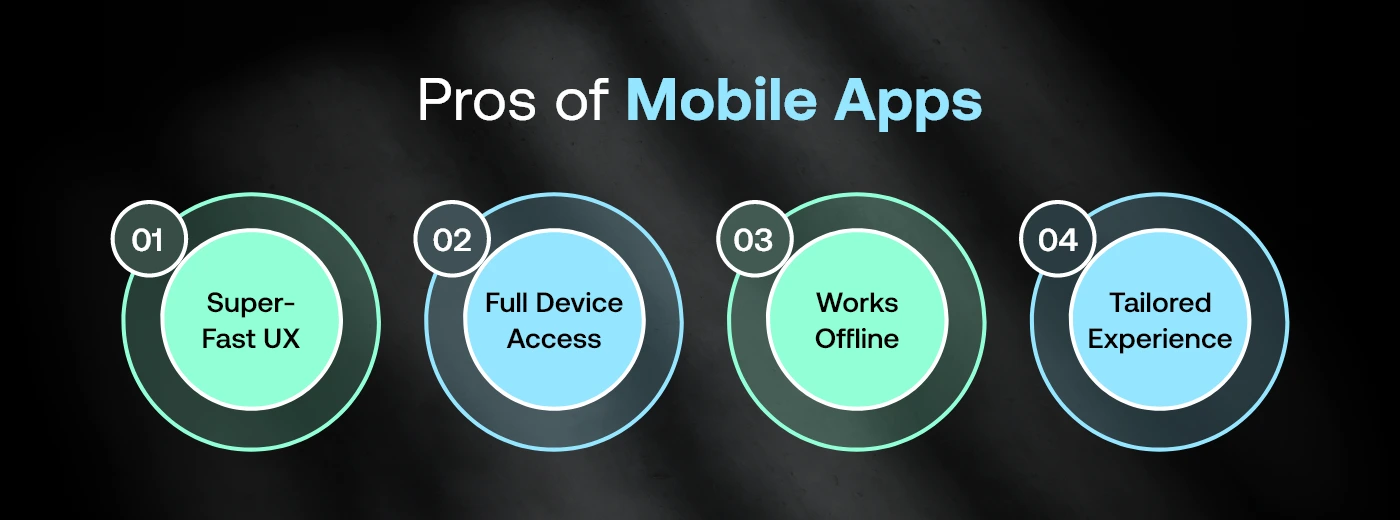
- Built for Speed and Responsiveness: Native mobile apps are designed specifically for iOS or Android. That means smooth transitions, fast load times, and interactions that feel seamless—not sluggish.
- Full Access to Device Hardware: Need to use the GPS, camera, fingerprint sensor, or push notifications? No problem. Mobile apps tap into everything your phone has to offer.
- Works Even When Offline: Unlike a lot of software applications that rely on internet connectivity, mobile apps can store data on the device. This means that if there’s no network connection, users can still access critical app features.
- Better Personalization and UX: The UI/UX of a mobile app is tailored to a specific device type, delivering increased customization, intuitive browsing and more personalized user experience.
Where Mobile Apps Demand More Effort
- Costlier to Build and Maintain: Developing apps for both platforms means you’ll need separate codebases (or a hybrid solution)—and that comes with added time and expense.
- App Store Processes Slow Things Down: Every update or new version has to be submitted and approved by Apple or Google. That can cause unexpected delays.
- More Steps for Users: Unlike a web app that opens in a click, mobile apps ask users to download, install, and often update manually—adding a bit of friction to the experience.
If you think about what are the difference between web apps and mobile apps, it’s relatively simple. Mobile apps are most effective when used for feature-rich, user-focused experiences; fitness trackers, shopping apps and social media platforms all excel as mobile apps.
Still Unsure What’s Right for Your Business?.
Let Codiant shape your product’s future—strategically, not just technically.
Our experts help startups and enterprises choose the right platform that aligns with user behavior, budget, and long-term goals.
Web App vs Website: Clearing the Confusion
A website is primarily static or content-driven—think blogs, company profiles, or landing pages. A web app, however, offers interactive features that enable users to perform tasks, edit data, or transact.
For example:
- A website might display your restaurant menu.
- A web app lets users book a table, pay, and leave feedback.
If your business needs dynamic, real-time engagement, a web app vs website comparison tilts in favor of apps.
When Should You Choose a Web App?
Opt for a web app when:
- You want to validate your idea fast (MVP)
- Your target audience is multi-device (desktop, tablet, mobile)
- You need to minimize launch costs
- Your app doesn’t rely heavily on offline access or native features
Use cases:
- Admin panels
- ERP tools
- Inventory and compliance management apps
When Should You Choose a Mobile App?
Go for a mobile app if:
- You need to send timely push notifications
- Your app uses device hardware (camera, GPS, etc.)
- Offline use is critical
- A seamless, high-performance user experience is key
Common in:
- Fitness & health tracking
- Social networking
- E-commerce & on-demand delivery
Hybrid Option: Progressive Web Apps (PWA)
PWAs are browser-based apps that mimic mobile functionality. They can be installed like apps, send push notifications, and work offline. They’re a sweet spot for businesses needing mobile-like behavior without building native apps.
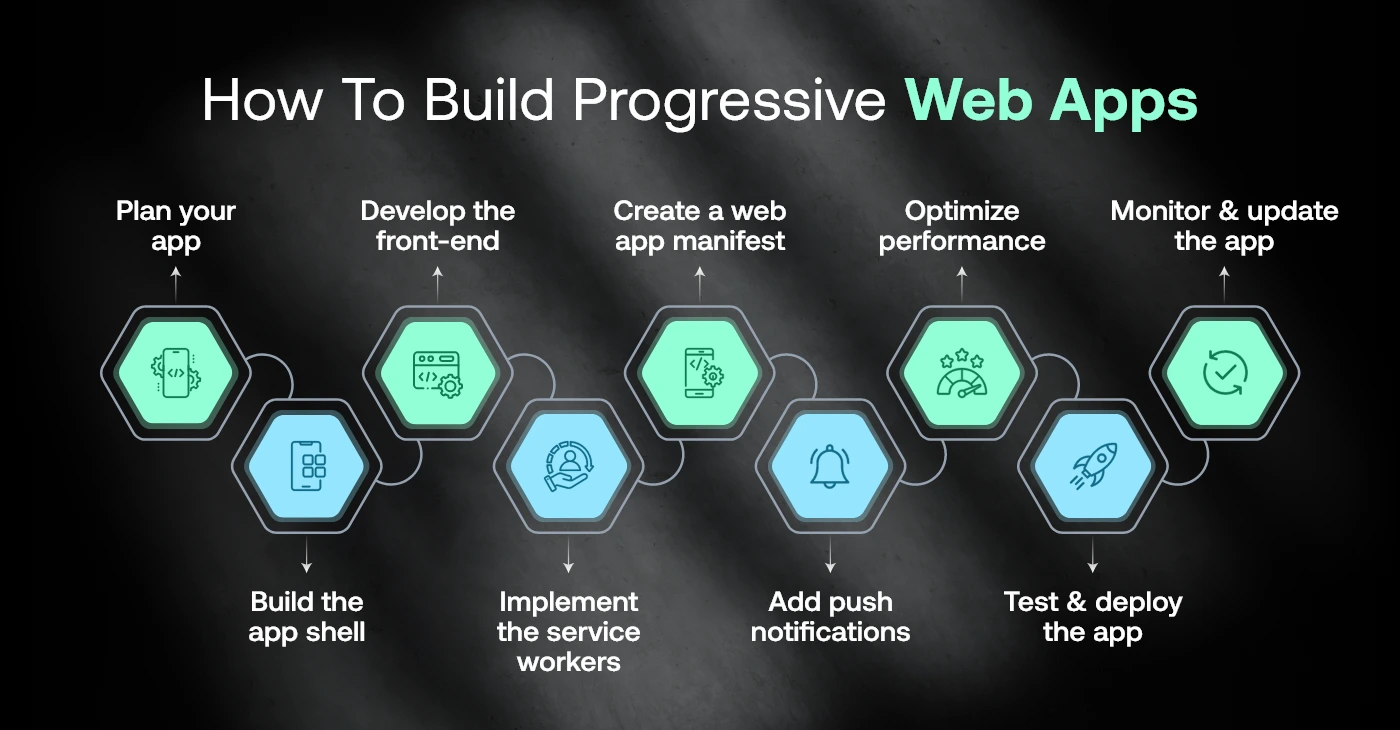
Notable PWAs:
- Twitter Lite
- Spotify Web
They are cost-effective and excellent for emerging markets or budget-conscious startups.
Choosing the Right Development Partner for Web & Mobile App
Your choice of development partner defines not just how your product looks, but how well it performs. A full-service web app development company in Saudi Arabia should offer:
- Expertise in both web and mobile development
- Business-centric product strategy
- Scalable architecture and future-readiness
- Post-launch support, analytics, and optimization
With the right web app design agency, your digital product can be faster, smarter, and more impactful from day one.
Conclusion
Choosing between a web app and a mobile app isn’t about which is more popular, it’s about which one aligns best with your users, your long-term vision, and the experience you want to deliver. The right choice can set the foundation for scalable growth and a seamless digital journey.
At Codiant, we don’t just build solutions, we craft digital experiences that make a difference. So if you’re seeking guidance from a results-driven web development agency in Saudi Arabia, your next step starts here.
Frequently Asked Questions
You can start with a web app for quick market analysis and later do its transition to native or hybrid mobile apps based on user demand.
Web apps are generally less expensive because there is one codebase and no reliance on apps stores.
Web apps often take 2–3 months. Mobile apps (both iOS and Android) 4–6 months and might take long time according to features and functionalities.
We have developed successful digital platforms for the healthcare, fintech, retail, logistics, fitness, education industries and others in every corner of the world.
Yes, we provide long-term support, performance tuning, and additional feature development as the natural extension of our relationship.
Absolutely. Our product strategists will assist you in comparing the two depending on audience behaviour, budgets, ROI models etc.
Featured Blogs
Read our thoughts and insights on the latest tech and business trends
How to Choose the Right AI Development Partner in the USA (Enterprise Guide 2026)
- February 12, 2026
- Artificial Intelligence
In a Nutshell Enterprise AI success starts with clear business goals, not vague plans like “we need AI.” The best AI development partners deliver real production systems, not just impressive demos or prototypes. Industry alignment... Read more
How AI Is Transforming Transport & Logistics Operations in Real Time
- February 10, 2026
- Artificial Intelligence Logistics & Transportation
In a Nutshell: AI in transport & logistics is enabling faster, smarter decision-making across fleets, warehouses, and supply chains. Real-time logistics optimization improves route planning, dispatching, and delivery efficiency as conditions change. AI-driven forecasting and... Read more
How Much Does It Cost to Hire a Dedicated Developer in 2026?
- February 6, 2026
- Staff Augmentation
In 2026, hiring software developers is a substantially different process than it was just a few years ago. Remote work has become the norm and businesses are no longer limited to hiring talent in their... Read more


